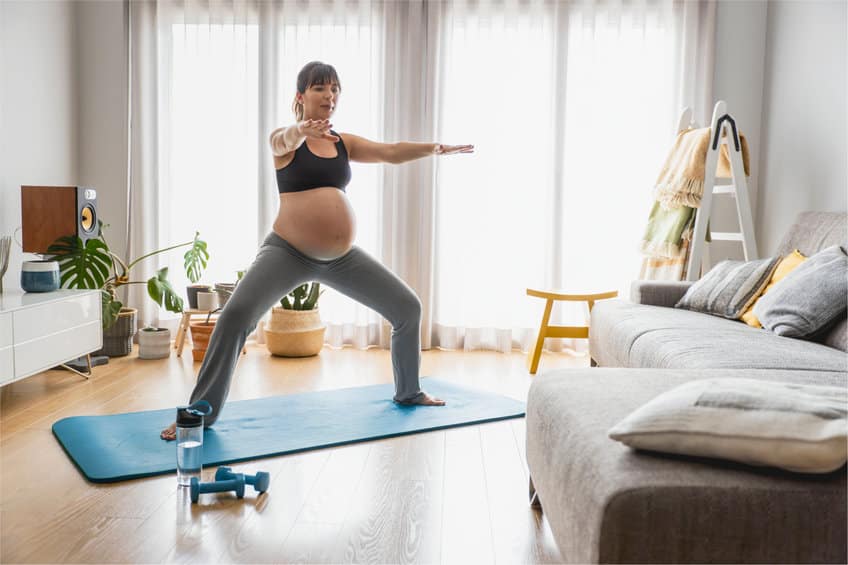By Kathy Driscoll –
Exercise during pregnancy? If Mom and baby are healthy, doctors give it a resounding thumbs-up. The American College of Obstetricians and Gynecologists suggests that women who engage in regular aerobic exercise have seen a wide array of benefits, including decreases in the risk of gestational diabetes, cesarean births and problems with postpartum recovery.
The U.S. Department of Health and Human Services Physical Activity Guidelines noted that those with uncomplicated pregnancies should consult their doctors first. But if given clearance, expectant moms should engage in aerobic and strength-conditioning exercises before, during, and after pregnancy. The department added that modifications to exercise routines might be necessary because of physiologic changes and fetal development.
“Pregnancy might seem like the perfect time to sit back and relax,” the Mayo Clinic acknowledged. “You likely feel more tired than usual, and your back might ache from carrying extra weight. But unless you’re experiencing complications, sitting around won’t help,” it reported. “Pregnancy can be a great time to get active – even if you haven’t exercised in a while.”
Besides potentially shortening labor and lowering the risk of gestational diabetes, exercise can help reduce backaches, constipation and bloating and help improve mood and energy levels during pregnancy, not to mention helping with and prevention of excess weight gain.
Studies also are starting to show other surprising benefits—some that might even affect the future health of the unborn babe.
Researchers at the University of Virginia (UVA), for example, discovered in a study of lab mice that maternal exercise during pregnancy may prevent the transmission of metabolic diseases from either an obese mother or father to their unborn child. The study did not confirm that the practice applies to humans, but if confirmed, it would have “huge implications” for helping pregnant women ensure the future health of their children.
“Most of the chronic diseases we talk about today are known to have a fetal origin,” noted Zhen Yan, an exercise expert at the UVA School of Medicine. “This is to say that parents’ poor health conditions prior to and during pregnancy have negative consequences to the child, potentially through chemical modification of the genes.”
The UVA results were remarkable and both simultaneously concerning and encouraging. It discovered that obese parents could predispose their offspring to metabolic disorders. However, when mothers exercise during pregnancy, they can prevent epigenetic changes affecting the children’s genes. “Maternal exercise completely blocked the negative effects of either mother’s or father’s obesity on the offspring. The results provide the first evidence that maternal exercise only during pregnancy can prevent transmission of metabolic diseases from parent to child.”
“The take-home message is that it is not too late to start to exercise if a mother finds herself pregnant,” Yan said. “Regular exercise will not only benefit the pregnancy and labor, but also the health of the baby for the long run.”
The studies and recommendations question what constitutes the right exercise for healthy pregnant women who are not in high-risk pregnancies. The Mayo Clinic recommends 30 minutes of moderate-intensity exercise on most days of the week. For those not already used to exercising, the clinic suggests building up routines by starting with just 10 minutes a day and gradually increasing the time. Walking, swimming, low-impact aerobics, or cycling are all excellent choices. Strength training is another option if you use light weights.
It is essential to warm us, stretch, cool down, and drink plenty of fluids during and after workouts. Call the doctor and stop exercising if you experience headaches, chest pain, dizziness, or bleeding.










